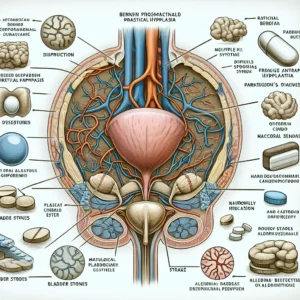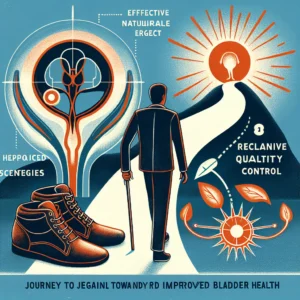Transform Your Life: Effective Strategies to Overcome Overactive Bladder Challenges
Dealing with the challenges posed by Overactive Bladder Syndrome (OAB) can evolve from a minor inconvenience into a serious disruption in your daily routine. This condition can severely affect your sleep quality, diminish your self-esteem, and even create tensions in your personal relationships. If you find yourself continually rushing to the restroom, waking up several times during the night, or facing sudden and intense urges to urinate, you should know that you are not isolated in this struggle. Many men experience these distressing symptoms, often mistakenly attributing frequent urination to the natural aging process. Thankfully, you don’t have to accept this uncomfortable state as your reality—numerous effective solutions are available to help you regain control over your life and enhance your overall wellness.
Understanding Overactive Bladder Syndrome and Its Impact on Your Life
Overactive Bladder Syndrome (OAB) is a widespread condition that affects millions globally, yet it remains a topic that is frequently overlooked and not adequately addressed. OAB occurs when there is a disruption in communication between the bladder’s nerves and muscles, leading to frequent and urgent urges to urinate. Unlike a urinary tract infection (UTI), which is typically a short-term issue easily treated with antibiotics, OAB is a chronic condition that requires a thoughtful combination of management strategies and lifestyle changes. Various factors can contribute to this syndrome, such as an enlarged prostate, specific neurological disorders, and dietary choices that may irritate the bladder, underscoring the necessity for a comprehensive understanding of its underlying causes and potential effects.
Identifying the Common Symptoms of Overactive Bladder Syndrome
A healthy bladder is designed to hold urine for extended periods; however, OAB disrupts this essential function, leading to a variety of distressing symptoms that can significantly intrude on everyday life. You may notice that you are making more than eight trips to the restroom each day, frequently waking at night due to an urgent need to urinate (nocturia), or experiencing an overpowering and sudden urge to relieve yourself. In some cases, individuals may also face urge incontinence, resulting in unintended leakage before reaching a toilet. While these symptoms may initially seem trivial, they can accumulate over time, severely affecting your productivity at work, damaging personal interactions, and compromising your mental health.
 Investigating the Underlying Causes of Overactive Bladder Syndrome
Investigating the Underlying Causes of Overactive Bladder Syndrome
The bladder serves as a complex organ that relies on a harmonious interplay of muscle contractions and nerve signals to function effectively. Disruptions in this intricate system can lead to the development of OAB. For many men, a common cause is benign prostatic hyperplasia (BPH), which can exert pressure on the bladder and prevent complete emptying. Moreover, neurological conditions like Parkinson’s disease, multiple sclerosis, and stroke can significantly disrupt normal bladder control. Other contributing factors may include bladder stones, certain medications, and high consumption of alcohol and caffeine, highlighting the multifaceted nature of this condition.
Assessing the Impact of Overactive Bladder Syndrome on Daily Life
If your daily activities revolve around restroom access, you are likely acutely aware of how disruptive OAB can be. Beyond the physical discomfort it brings, the consequences of this condition can be extensive and far-reaching. Sleep quality often deteriorates due to repeated nighttime bathroom visits, while work performance may suffer as you find yourself frequently stepping away from important meetings or tasks. Additionally, intimacy and sexual health can be negatively impacted due to feelings of embarrassment or anxiety regarding potential leakage. Over time, these challenges can lead to feelings of anxiety, depression, and social isolation. Fortunately, there are practical and effective solutions available that do not necessarily depend on invasive procedures or medications that could result in undesirable side effects.
Effective Techniques to Regain Control Over Your Bladder Health
Successfully managing OAB requires a holistic approach that goes beyond merely limiting fluid intake or avoiding caffeine. A well-rounded strategy focused on bladder health, nerve function, and muscle control is essential for achieving significant improvement. Thankfully, natural therapies, lifestyle changes, and alternative treatments have demonstrated promising results in alleviating symptoms without the potential drawbacks associated with conventional prescription medications.
Implementing a Holistic Approach to Manage OAB Effectively
Recent studies increasingly support the efficacy of herbal medicine, acupuncture, and personalized exercises in addressing bladder dysfunction. By targeting the underlying causes rather than merely addressing the symptoms, you can achieve lasting relief and empower yourself to take charge of your health journey.
 Leveraging Herbal Remedies for Improved Bladder Function
Leveraging Herbal Remedies for Improved Bladder Function
Nature provides a plethora of remedies for enhancing urinary health. Herbal extracts such as horsetail, nettles, and dandelion have long been utilized to promote healthy bladder function. Horsetail serves as a natural diuretic, aiding in the reduction of fluid retention while simultaneously strengthening bladder tissue. Nettles are known for their anti-inflammatory properties and support prostate health, making them particularly advantageous for men experiencing OAB related to BPH. Moreover, dandelion root enhances urinary tract health by detoxifying and supporting kidney function. When taken in micro-encapsulated daily doses, these herbal remedies can offer consistent support without the adverse effects often experienced with synthetic medications.
Utilizing Acupuncture for Enhanced Bladder Control
The principles of Traditional Chinese Medicine emphasize the importance of energy flow in maintaining optimal function of the organs. Acupuncture, which involves the insertion of fine needles into specific points on the body, has been shown to effectively regulate bladder activity. Research suggests that acupuncture can improve bladder control by calming overactive nerves and strengthening pelvic floor muscles. Over time, consistent practice can result in reduced urges, increased bladder capacity, and improved sleep quality.
Strengthening Your Pelvic Floor Muscles for Better Bladder Control
Weak pelvic muscles can significantly contribute to the symptoms associated with OAB. Targeted pelvic floor exercises, commonly known as Kegel exercises, can effectively strengthen these muscles, leading to improved bladder control. Unlike high-impact workouts that may worsen urinary issues, Kegel exercises are discreet, can be performed in various settings, and are highly effective. Regular practice not only helps prevent leakage but also reduces the sudden urgencies that are characteristic of OAB.
Transform Your Lifestyle for Significant Improvements in Bladder Health
If OAB is adversely impacting your quality of life, it’s essential to reevaluate your daily habits. Cutting back on caffeine, alcohol, and artificial sweeteners can lead to notable improvements since these substances are known irritants to the bladder lining. Staying properly hydrated is vital, but the timing of fluid intake also plays a crucial role—consider hydrating earlier in the day and limiting liquid consumption in the evening to minimize nighttime restroom visits. Furthermore, managing stress is critical, as anxiety can trigger bladder spasms and worsen symptoms. Engaging in deep breathing exercises, meditation, and mindfulness practices can significantly soothe the nervous system and enhance bladder control.
 Take Charge of Your Bladder Health and Transform Your Life Now
Take Charge of Your Bladder Health and Transform Your Life Now
Living with OAB should not dictate the quality of your life. By implementing effective strategies, you can regain control over your bladder, boost your confidence, and enhance your overall quality of life. If you’re ready to explore natural therapies, acupuncture, and personalized guidance tailored to your specific needs, today is the ideal time to take action. There’s no reason to endure discomfort in silence when effective solutions are readily available to support you.
Your Questions Answered: Common Inquiries Regarding OAB
What are the main causes of overactive bladder in men?
The prevalence of overactive bladder in men is often linked to prostate enlargement, nerve dysfunction, bladder irritation, and various lifestyle choices. Certain medications and underlying health conditions can also contribute to the onset of symptoms.
How can I differentiate between OAB and simple excessive fluid intake?
The primary symptoms of OAB include frequent urination, sudden urgency, and nighttime awakenings, regardless of your fluid consumption. If reducing your water intake does not alleviate these symptoms, it likely indicates an underlying bladder dysfunction rather than mere overhydration.
Are herbal treatments effective for improving bladder control?
Yes, herbal remedies like horsetail, nettles, and dandelion have historically been employed to enhance urinary health. When utilized in appropriate dosages and forms, these remedies can help reduce urgency, strengthen bladder tissue, and improve control over urinary functions.
Can acupuncture truly help alleviate symptoms of OAB?
Clinical studies suggest that acupuncture can effectively regulate bladder activity, lessen urgency, and strengthen pelvic muscles. Many individuals report significant improvements in their symptoms following consistent acupuncture treatments.
Is experiencing OAB a normal part of aging?
While changes in bladder function may occur with age, OAB is not an inevitable aspect of aging. Symptoms can be effectively managed through appropriate lifestyle changes, natural treatments, and professional support.
What lifestyle adjustments can help alleviate OAB symptoms?
Reducing intake of caffeine, alcohol, artificial sweeteners, and spicy foods can greatly diminish bladder irritation. Strengthening pelvic muscles, managing stress levels, and ensuring proper hydration (with strategic timing of fluid intake) are also effective methods for regulating bladder activity.
When should I seek professional assistance for OAB?
If frequent urination disrupts your sleep, interferes with daily activities, or leads to feelings of embarrassment, it’s important to seek professional help. You do not have to suffer silently—numerous effective solutions are available to assist you in managing your symptoms.
Presented By: Overactive Bladder Treatment
Connect with Us on Facebook
The Article: Overactive Bladder Syndrome: What You Need To Know first appeared on https://mcrtherapies.co.uk
The Article Overactive Bladder Syndrome: Essential Information You Should Know appeared first on https://mcrtherapies.com
The Article Overactive Bladder Syndrome: Key Facts You Need to Know Was Found On https://limitsofstrategy.com





Comments are closed